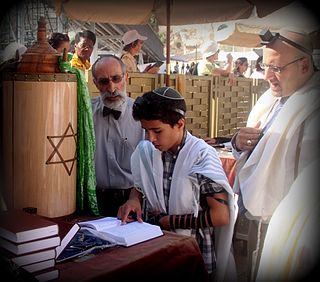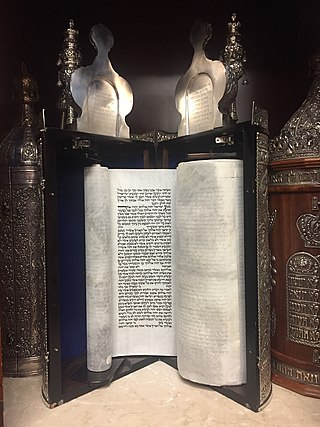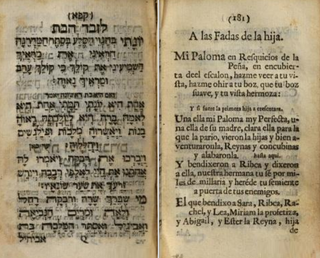
The role of women in Judaism is determined by the Hebrew Bible, the Oral Law, by custom, and by cultural factors. Although the Hebrew Bible and rabbinic literature mention various female role models, religious law treats women differently in various circumstances. According to a 2017 study by the Pew Research Center, women are slightly more likely to identify with Judaism. They account for 52% of the worldwide Jewish population.

A synagogue, sometimes referred to by the Yiddish term shul and often used interchangeably with the word temple, is a Jewish house of worship. Synagogues have a place for prayer, where Jews attend religious services or special ceremonies, have rooms for study, social hall(s), administrative and charitable offices, classrooms for religious school and Hebrew school, sometimes Jewish preschools, and often have many places to sit and congregate; display commemorative, historic, or modern artwork throughout; and sometimes have items of some Jewish historical significance or history about the Synagogue itself on display.

A bar mitzvah (masc.) or bat mitzvah (fem.) is a coming-of-age ritual in Judaism. According to Jewish law, before children reach a certain age, the parents are responsible for their child's actions. Once Jewish children reach that age, they are said to "become" b'nai mitzvah, at which point they begin to be held accountable for their own actions. Traditionally, the father of a bar or bat mitzvah offers thanks to God that he is no longer punished for his child's sins.

A yeshiva is a traditional Jewish educational institution focused on the study of Rabbinic literature, primarily the Talmud and halacha, while Torah and Jewish philosophy are studied in parallel. The studying is usually done through daily shiurim as well as in study pairs called chavrusas. Chavrusa-style learning is one of the unique features of the yeshiva.

Torah study is the study of the Torah, Hebrew Bible, Talmud, responsa, rabbinic literature, and similar works, all of which are Judaism's religious texts. According to Rabbinic Judaism, the study is done for the purpose of the mitzvah ("commandment") of Torah study itself.

Kiddush, literally, "sanctification", is a blessing recited over wine or grape juice to sanctify the Shabbat and Jewish holidays. Additionally, the word refers to a small repast held on Shabbat or festival mornings after the prayer services and before the meal.

A Sefer Torah or Torah scroll is a handwritten copy of the Torah, meaning the five books of Moses. The Torah scroll is mainly used in the ritual of Torah reading during Jewish prayers. At other times, it is stored in the holiest spot within a synagogue, the Torah ark, which is usually an ornate curtained-off cabinet or section of the synagogue built along the wall that most closely faces Jerusalem, the direction Jews face when praying.

Zeved habat or Simchat Bat is the Jewish naming ceremony for newborn girls. The details of the celebration varies somewhat by Jewish community and will typically feature the recitation of specific biblical verses and a prayer to announce the name of the newborn child.
Torah reading is a Jewish religious tradition that involves the public reading of a set of passages from a Torah scroll. The term often refers to the entire ceremony of removing the scroll from the Torah ark, chanting the appropriate excerpt with special cantillation (trope), and returning the scroll(s) to the ark. It is also commonly called "laining".
Hebrew school is Jewish education focusing on topics of Jewish history, learning the Hebrew language, and finally learning their Torah Portion, in preparation for the ceremony in Judaism of entering adulthood, known as a Bar or Bat Mitzvah. Hebrew School is usually taught in dedicated classrooms at a Synagogue, under the instruction of a Hebrew teacher, and often receives support from the cantor for learning the ancient chanting of their Torah portion, and from the rabbi during their ceremony since they must read from a Torah scroll, which has no Hebrew vowels, and very close together text and minimal line spacing; making it very challenging for almost anyone to read from.
Jewish feminism is a movement that seeks to make the religious, legal, and social status of Jewish women equal to that of Jewish men in Judaism. Feminist movements, with varying approaches and successes, have opened up within all major branches of the Jewish religion.
Pizmonim are traditional Jewish songs and melodies sung with the intention of praising God as well as learning certain aspects of traditional religious teachings. They are sung throughout religious rituals and festivities such as prayers, circumcisions, bar mitzvahs, weddings and other ceremonies.
A wimpel is a long, linen sash used as a binding for the Sefer Torah by Jews of Germanic (Yekke) origin. It is made from the cloth used to swaddle a baby boy at his bris milah, uniting the communal world of the synagogue with the individual's own life cycle.
Orthodox Jewish feminism is a movement in Orthodox Judaism which seeks to further the cause of a more egalitarian approach to Jewish practice within the bounds of Jewish Law. The major organizations of this movement is the Jewish Orthodox Feminist Alliance (JOFA) in North America, and Women of the Wall (WOW) and its affiliates in Israel and internationally, known as The International Committee for Women of the Wall (ICWOW). In Israel, the leading Orthodox feminist organization is Kolech, founded by Dr. Chana Kehat. In Australia, there is one Orthodox partnership minyan, Shira Hadasha, in Melbourne.

Aaron L. Raskin is an American Chabad Lubavitch rabbi and writer. He serves as spiritual leader of Congregation B'nai Avraham, an Orthodox synagogue in Brooklyn Heights, New York, and dean of Brooklyn Heights Jewish Academy.

Maamarim/Ma'amorim in Chabad Hasidism are the central format texts of in-depth mystical investigation in Hasidic thought. In Chabad philosophy, the textual format of the Maamar is used in a great number of published works.
Dov Linzer is the President and Rabbinic Head of the Modern Orthodox Yeshivat Chovevei Torah Rabbinical School in Riverdale, New York. He is a teacher, lecturer, podcaster, and author.
An adult bar/bat mitzvah is a bar or bat mitzvah of a person older than the customary age. Traditionally, a bar or bat mitzvah occurs at age 13 for boys and 12 for girls. However, many adult Jews who have never had a bar or bat mitzvah choose to have one later in life, and many who have had one at the traditional age choose to have a second. An adult bar or bat mitzvah can be held at any age after adulthood is reached and can be performed in a variety of ways.
Objects used in Jewish rituals are known collectively as Judaica. The conservation and restoration of Judaica takes into account the collective body of Jewish religious laws derived from the written and oral Torah known as halacha in order to properly care for these materials. This work involves identifying these objects and therefore knowing how any of these objects are traditionally handled, stored, exhibited, and generally cared for based on their use and significance.
Rabbi Amichai Yehuda Lau-Lavie is a social entrepreneur, human rights activist and LGBT, conservative rabbi, founder and spiritual leader of the Lab/Shul community in New York.









